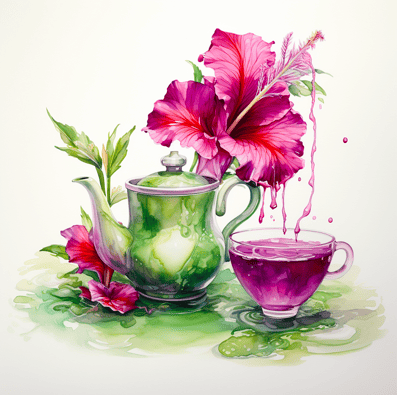
Don’t want to read the whole post?
Hibiscus tea is acidic and may not be suitable for everyone, especially pregnant women or those with acid reflux, sensitive stomachs, or certain health conditions. While it offers health benefits like lowering blood pressure and being rich in antioxidants, it’s best enjoyed in moderation.
ABOUT ME
Be beauty. Be plant-based!
As a former Registered Nurse and avid plant-muncher, I’m in love with how simple plant-based foods make it easy to be beautiful.

You’ll also love:
How to Brew Perfect Hibiscus Tea from Your Garden
Is Hibiscus Tea Safe Every Day? Find Out!
Today, we’re diving into the delightful world of hibiscus tea. This vibrant herbal tea, famous for its stunning red colour and unique taste, is more than just a treat for the senses. In a world where health and beauty are paramount, yet time is precious, understanding the nature of what we consume is crucial. So, let’s answer a burning question: Is Hibiscus Tea Acidic? Not only will we explore its acidity, but we’ll also uncover how this enchanting tea can be a part of your journey towards a healthier, more attractive you.
What is Hibiscus Tea?
Hibiscus tea is a delightful infusion made from the dried parts of the Hibiscus sabdariffa L. plant, often referred to as the hibiscus flower. It’s a staple in many cultures, cherished for its deep red colour, tart flavour, and the multitude of health benefits it offers.
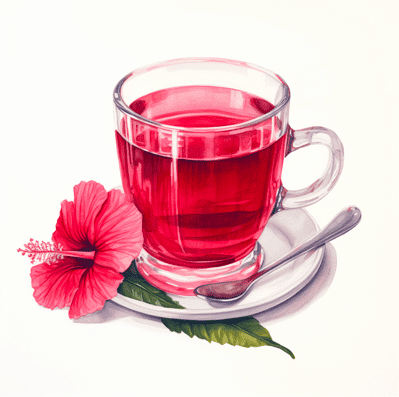
Known to many as a sour tea, its popularity has surged among those seeking natural, plant-based additions to their diet. Whether you’re sipping a steaming hot tea on a cozy evening or enjoying a refreshing cup of hibiscus tea with ice on a sunny day, this beverage is versatile and full of character.
Is hibiscus tea acidic or alkaline?
When it comes to the acidity of hibiscus tea, it’s important to note that this tea leans towards the acidic end of the pH scale.
Specifically, hibiscus tea typically has a pH level around 2.5-3, making it quite acidic. This acidity is mainly due to the presence of natural organic acids such as malic acid, citric acid, and tartaric acid. These acids contribute not only to the tea’s signature tartness but also to its overall health properties.
However, for those who are sensitive to acidic foods or suffer from acid reflux, it’s essential to consider this characteristic of hibiscus tea. The tea’s vibrant acidity, while a delight to the taste buds, might need moderation in your diet depending on your health conditions.
Skincare Benefits of Hibiscus Tea
Natural Skincare Enhancer
- Rich in Vitamin C: The high vitamin C content in hibiscus flowers aids in boosting skin health, contributing to a brighter and more even skin tone.

Skin Rejuvenation
- Fighting Free Radicals: Regular use of hibiscus tea, either consumed or applied topically, can protect the skin from damage caused by free radicals, helping to maintain a youthful appearance.
In both its health and skincare benefits, hibiscus tea proves to be a versatile and beneficial addition to a plant-based, health-focused lifestyle. Whether it’s for lowering blood pressure, aiding weight loss, or enhancing skin health, this flavourful tea offers a natural way to support your wellness and beauty regime.
You’ll also love:
Glow Up With Jasmine Green Tea Skin Secrets
Health Benefits of Hibiscus Tea
Blood Pressure and Heart Health
- Lowering Blood Pressure: Hibiscus tea, particularly the hibiscus extract, has been studied for its ability to reduce high blood pressure, a key factor in preventing cardiovascular diseases.
- Heart-Healthy Antioxidants: The tea is rich in antioxidants, known for their role in maintaining heart health and managing cholesterol levels.
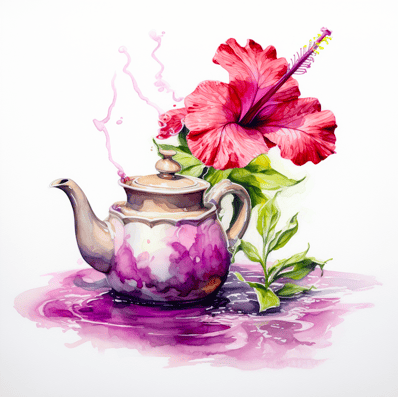
Antioxidant Power and Wellness
- Combatting Free Radicals: Rich in antioxidants, hibiscus tea helps fight free radicals, reducing oxidative stress in the body.
- Vitamin C: Hibiscus flowers are a good source of Vitamin C, crucial for overall health and immune function.
- Green Tea Comparison: While green tea is well-known for its health benefits, hibiscus tea stands out with its unique set of antioxidants and potential for lowering blood pressure.
Weight Management
- Aiding in Weight Loss: Regular consumption of hibiscus tea may support weight loss efforts, possibly due to its diuretic properties and its role in metabolism.
Brewing Hibiscus Tea
When it comes to brewing the perfect cup of hibiscus tea, there are a few tips and tricks that can enhance both its flavour and health benefits.
Ensure ingredient quality
To begin with, whether you choose fresh hibiscus flower or loose hibiscus tea, the quality of the ingredients plays a crucial role. Fresh or loose tea options are often less processed and may offer a more authentic and less acidic taste compared to pre-packaged tea bags.
Shorten brewing time
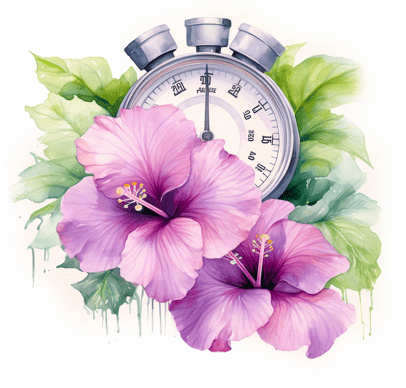
The brewing time is also key to ensuring your hibiscus tea doesn’t become overly acidic. While longer brewing times can intensify the flavour and colour, they can also increase the tea’s acidity.
Therefore, a shorter brewing time is recommended to keep the acidity at a more moderate level. This is particularly important for those who may be sensitive to acidic foods or suffer from acid reflux.
Side Effects and Interactions
While hibiscus tea is celebrated for its potential health benefits, it’s also important to be aware of its side effects and interactions, especially due to its acidity.
Acid Reflux
The acidity of hibiscus tea may worsen acid reflux symptoms. Moderation is key.
Medication Interaction
Additionally, hibiscus tea can interact with certain medications, particularly blood pressure medications. Due to its blood pressure-lowering effects, it’s essential to consult with a healthcare professional before incorporating hibiscus tea into your routine, especially if you are on medication for blood pressure or other cardiovascular conditions.
Safe Consumption Levels of Hibiscus Tea
While hibiscus tea offers various health benefits, it’s essential to consume it in moderation to avoid any adverse effects, especially due to its acidity. Here’s what you need to know about the safe consumption levels:
- Moderation is Key: Generally, up to three cups of hibiscus tea per day are considered safe for most individuals.
- Individual Differences: The ideal amount can vary based on individual health conditions, particularly for those with acid reflux or on certain medications.
- Consultation with Healthcare Providers: Before significantly including hibiscus tea in your diet, especially if you have existing health concerns or are taking medication, consulting a healthcare professional is advisable.
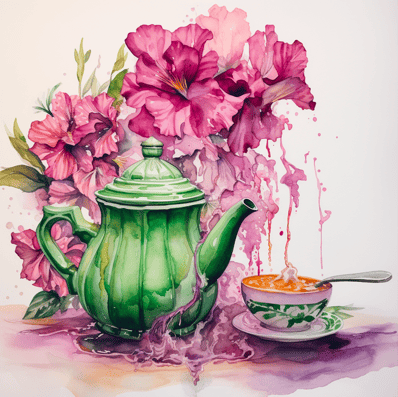
Reducing the Acidity of Hibiscus Tea
For those who love hibiscus tea but are concerned about its acidity, there are ways to enjoy this beverage with reduced acidity:
- Dilution: Add more water to your brew. This simple step can significantly lower the tea’s acidity.
- Shorter Steeping Time: Brew the tea for a shorter duration. This prevents excessive extraction of acidic components.
- Alternative Brewing Methods: Using cold brewing techniques can also result in a less acidic tea.
Remember, enjoying hibiscus tea is all about finding the right balance that suits your taste and health needs. By tweaking the brewing method and being mindful of consumption levels, you can enjoy this delightful tea while taking care of your health.
Which Tea is Least Acidic?
When considering the acidity of various teas, it’s important to understand where hibiscus tea stands in comparison to others. Here’s a brief overview:
- Hibiscus Tea: With a pH level between 2.5-3, hibiscus tea is quite acidic. This gives it its characteristic tart flavour.
- Black tea, Green tea, and Oolong Tea: These teas have less acidic pH levels compared to hibiscus tea, generally ranging from 4.9 to 10. Black and oolong tea tends to be less acidic, while green tea tends to be alkaline.
- Herbal Teas: Teas like chamomile tea, peppermint tea, and rooibos are among the least acidic. They often have pH levels closer to neutral (pH 7), making them a gentle choice for those sensitive to acidity.
In summary, while hibiscus tea is more acidic, herbal teas like chamomile and peppermint are considered the least acidic and are often recommended for their soothing properties. If you’re looking for a less acidic tea, herbal varieties are usually your best bet.
Hibiscus Tea in a Plant-Based Diet
Incorporating hibiscus tea into a plant-based diet can be a delightful way to enhance your health and wellness journey:
- Rich in Nutrients: Hibiscus tea is a great addition to a plant-based diet, offering a range of nutrients and antioxidants.
- Versatile Drink: It can be enjoyed hot or cold, making it a versatile choice for any season.
- Complements a Healthy Lifestyle: Regular consumption of hibiscus tea can complement the health benefits of a plant-based diet, contributing to overall wellness.
Whether it’s a warm cup to start the day or a refreshing iced brew in the afternoon, hibiscus tea can be a flavourful and healthful component of a plant-based lifestyle.
Is hibiscus tea acidic?
In summary, hibiscus tea is indeed acidic, with a pH level between 2.5 and 3.5, contributing to its unique tart flavour. While it offers health benefits like lowering high blood pressure and being rich in antioxidants, moderation is key, especially for those with acid reflux. As part of a balanced, plant-based diet, hibiscus tea can be a delightful addition, enhancing your wellness journey. Enjoy this vibrant tea, but always listen to your body’s needs and preferences.
FAQ: Is hibiscus tea acidic?
When should you not drink hibiscus tea?
Pregnant and Breastfeeding Women: Hibiscus tea might affect oestrogen levels, so it’s not recommended for pregnant women or those breastfeeding.
Before Surgery: Due to its effects on blood pressure, it’s advisable to avoid hibiscus tea before undergoing surgery.
With Certain Medications: Hibiscus tea can interact with medications like those for blood pressure or diabetes.
Is hibiscus tea bad for your stomach?
While not inherently bad for the stomach, its acidity might cause discomfort for those with sensitive stomachs, especially when consumed on an empty stomach.
Is hibiscus tea ok for acid reflux?
Due to its acidity, hibiscus tea might exacerbate acid reflux symptoms. It’s best to avoid it if you have a history of acid reflux.
Who cannot drink hibiscus tea?
Blood Pressure Considerations: People with significantly low systolic or diastolic blood pressure should be cautious, as hibiscus tea can lower blood pressure further.
Diabetics: Those with low blood sugar levels or on diabetes medication should consult a doctor, as hibiscus tea can affect blood sugar.
Liver Conditions: Excessive consumption can lead to liver damage; thus, those with liver problems should avoid it.
What not to mix with hibiscus tea?
Medications: Avoid mixing hibiscus tea with blood pressure and diabetes medications due to potential interactions.
Alcohol: Mixing with alcohol isn’t recommended as it might exacerbate the diuretic effect of the tea.
What happens when you drink hibiscus tea before bed?
Relaxing Effects: Hibiscus tea, known as agua de jamaica in some cultures, can have a calming effect, making it a suitable choice before bedtime. However, for some, its diuretic properties might lead to sleep disturbances due to the need for frequent bathroom visits.